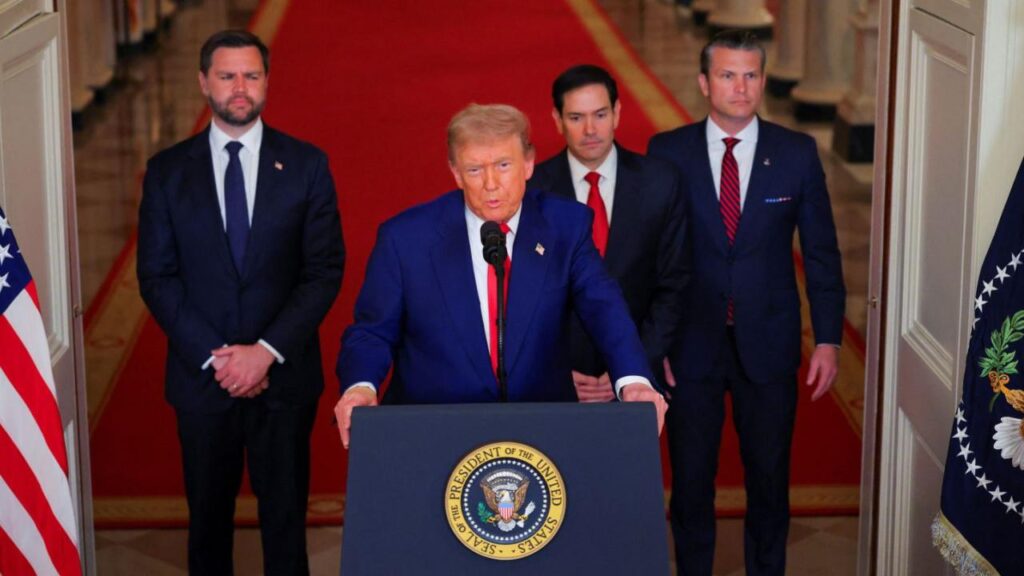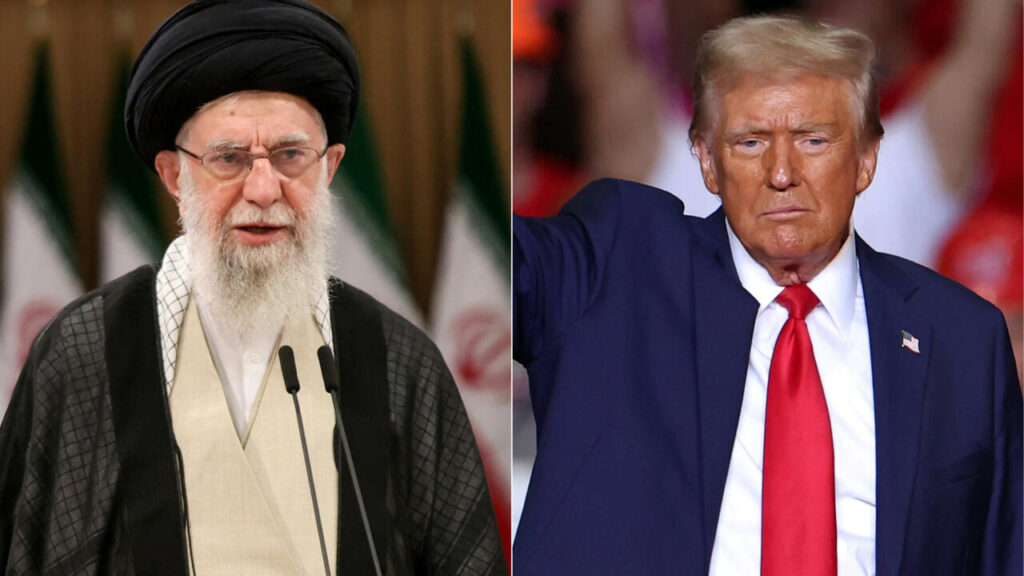In the tumultuous years of Donald Trump’s presidency, the world witnessed a dramatic shift in U.S. foreign policy, especially when it came to Iran. One of the most consequential aspects of this shift was Trump’s decision to abandon the Joint Comprehensive Plan of Action (JCPOA), commonly known as the Iran Nuclear Deal. The stakes were high — not just for U.S.-Iran relations, but for global security, diplomacy, and America’s standing in the international community. Yet, despite advice from top U.S. experts and allies, Trump’s administration chose to chart its own path on Iran’s nuclear ambitions. Why did the former president choose to ignore expert counsel on this issue, and what were the broader implications?

Trump’s Refusal to Listen to U.S. Experts on Iran’s Nuclear Program
| Takeaway | Stat |
|---|---|
| Trump withdrew from the JCPOA in May 2018 | Iran’s nuclear activity increased significantly post-withdrawal |
| 60% of Americans opposed Trump’s withdrawal from the nuclear deal | This policy move split U.S. public opinion |
| Trump’s strategy led to rising tensions in the Middle East | Military confrontations between the U.S. and Iran intensified |
The aftermath of Trump’s decision to pull out of the Iran nuclear deal is still unfolding. As the Biden administration works to revive the deal, the legacy of Trump’s actions looms large. It’s clear that the stakes were much higher than just the fate of Iran’s nuclear program. By disregarding expert advice and pursuing an aggressive, unilateral foreign policy, Trump not only damaged the U.S.’s credibility but also heightened the risk of military conflict in the Middle East.
The question remains: Could a different approach to Iran, one based on diplomacy and expert guidance, have produced better outcomes? The answer may lie in future diplomatic efforts and the lessons learned from the high-stakes gamble of the Trump administration’s “maximum pressure” campaign.
A Bold Decision with Consequences
In May 2018, Donald Trump made a historic decision to pull the United States out of the Iran nuclear deal, a multilateral agreement that aimed to limit Iran’s nuclear capabilities in exchange for sanctions relief. The deal, negotiated by the Obama administration in 2015, was hailed as a major diplomatic achievement by many, including U.S. allies in Europe and the Middle East. However, Trump and many of his key advisors viewed the deal as deeply flawed, citing concerns that it didn’t go far enough to curb Iran’s nuclear program, nor did it address Iran’s regional behavior.
The problem? The experts inside and outside the U.S. government, including those within the Trump administration itself, warned that exiting the deal would only exacerbate the very problems it sought to prevent — and could even push Iran toward developing nuclear weapons faster.
As Trump’s decision to withdraw from the deal unfolded, many experts believed that the strategy would backfire, leading to a breakdown in trust with U.S. allies and heightening tensions with Iran. This would also create the conditions for an even more dangerous arms race in the region, with Iran potentially speeding up its nuclear activities as a response to what they saw as American hostility.
The Experts’ Warnings
Leading up to the withdrawal, the U.S. intelligence community, including top experts within the State Department and the CIA, had expressed concerns about the potential consequences of leaving the nuclear deal. One of the most critical points was that the deal had, in fact, been successful in preventing Iran from rapidly advancing its nuclear program. The International Atomic Energy Agency (IAEA) verified that Iran was complying with the terms of the agreement.
For instance, IAEA Director General Yukiya Amano, a respected figure in the global nonproliferation community, stated that Iran was adhering to the restrictions set by the deal. And yet, in spite of this consensus from experts, Trump and his advisors felt that the deal was inherently flawed and that they could negotiate a better one. In his view, the JCPOA was an example of appeasement — a policy of tolerating Iran’s “malign behavior” in exchange for a temporary halt to its nuclear ambitions.
This stance was also reflected in the rhetoric of some of Trump’s key allies, such as former National Security Advisor John Bolton, who championed a hardline approach to Iran. Bolton argued that the only way to deal with Iran’s nuclear ambitions was to abandon the deal entirely, reinstate harsh sanctions, and increase military pressure.
The Long-Term Consequences of Withdrawing from the Deal
The Trump administration’s withdrawal from the Iran nuclear deal marked a sharp pivot from the policy of engagement and diplomacy that had defined U.S. efforts in the region under President Obama. It not only angered the European signatories of the deal — Britain, France, and Germany — but also led to a deterioration in relations with U.S. allies in the Middle East, including Israel and the Gulf states.
As many experts predicted, the withdrawal did not lead to a more favorable position for the United States. Instead, Iran began to scale back its compliance with the terms of the deal. Tehran resumed enriching uranium beyond the agreed-upon limits, and soon after, Iran was producing weapons-grade uranium at a rate that alarmed international observers. This was a direct response to the so-called “maximum pressure” campaign imposed by the Trump administration, which aimed to cripple Iran’s economy through sanctions.
Moreover, the U.S. pullout did not lead to any immediate negotiations with Iran on a new deal. Instead, tensions escalated, resulting in military confrontations, including the attack on an American drone in June 2019 and the U.S. assassination of General Qasem Soleimani in January 2020. These events led to fears of a direct military conflict between the two nations, which experts had long warned could have catastrophic consequences.

Why Trump Ignored Expert Advice
There were several reasons why Trump chose to ignore the advice of his experts, both within the U.S. government and from the international community. At the heart of Trump’s decision-making process was a deeply held belief in American exceptionalism and a desire to pursue a foreign policy independent of multilateral agreements that he saw as unfavorable to U.S. interests.
Trump also believed that his “Art of the Deal” approach to diplomacy could yield better results than the JCPOA. He positioned himself as a master negotiator who could achieve more favorable terms for the U.S., particularly in areas beyond Iran’s nuclear program, like its missile development and its regional activities in Syria and Yemen. He also likely felt that challenging Iran directly would appeal to his political base, which saw his aggressive stance on foreign policy as a strength.
Furthermore, Trump’s administration was heavily influenced by hawkish figures like Bolton and Secretary of State Mike Pompeo, who believed that Iran’s nuclear ambitions were just one piece of a much larger regional puzzle. They argued that a broader, more confrontational approach to Iran — rather than reliance on a multilateral agreement — was the only way to curb Tehran’s influence in the region.
The Bigger Picture: Global Consequences
Trump’s refusal to listen to experts on Iran’s nuclear program not only had immediate consequences for U.S.-Iran relations, but it also set the stage for broader geopolitical instability. By unilaterally withdrawing from the JCPOA, Trump sent a clear message to other countries that the U.S. might not honor future international agreements — undermining the credibility of American diplomacy and leadership on the world stage.
The withdrawal also had a ripple effect on other countries that were negotiating their own nuclear deals, including North Korea. Kim Jong-un and other leaders may have taken note of the U.S.’s failure to honor the deal with Iran, which could have contributed to the collapse of the Trump administration’s attempts to negotiate with North Korea.
FAQs
Why did Trump pull out of the Iran nuclear deal?
Trump pulled out of the Iran nuclear deal because he believed it was flawed and didn’t go far enough to limit Iran’s nuclear activities. He also wanted to address Iran’s regional behavior, including its missile program and involvement in conflicts across the Middle East.
What were the consequences of the U.S. leaving the Iran nuclear deal?
After the U.S. left the Iran nuclear deal, tensions between the two countries escalated. Iran resumed nuclear enrichment beyond the agreed limits, and the U.S. imposed harsh sanctions, leading to a greater risk of military conflict and regional instability.
Could the U.S. have handled Iran differently under Trump’s administration?
Many experts believe that a more diplomatic approach, keeping the Iran nuclear deal intact while negotiating other issues, might have led to more stable outcomes. Trump’s “maximum pressure” strategy instead exacerbated tensions.






